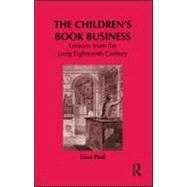- ISBN: 9780415937894 | 0415937892
- Cover: Hardcover
- Copyright: 12/14/2010
Children's Book Businessis an exploration of how children's literature and children's lit publishing has been shaped by the relationship between what the author calls "status quo" books -- didactic ones that support a perceived social order and often deny truths of the real, adult world -- and what she calls "guerilla" books -- those that undermine or question the values of the social order and actually encourage negotiation with the real world, albeit in a coded, literary way. Following an introductory case study, part one looks at the history of publishing for children and the marketing of children's literature, which has changed very little since 1744 when John Newbery established the magic promotional combination: instruction and delight. Paul explains why this has always been a dysfunctional agenda. Part two is about guerilla books. Since they don't "improve" children, guerilla books are suspect, and they provoke resistance from adults because they expose the kinds of real-life lessonsadults don't want their children to learn. Paul posits that these books form an army of resistance, genuinely communicating and often winning their way into social approval and sometimes the canon (Where the Wild Things Are,Harry Potter). Part three takes a look at the children's publishing industry and how it's been altered with the megamerger mentality shifting to entertainment and money (toys, cartoon/film tie-ins). Part four is about the threat to worthwhile children's lit posed by standardized testing in schools. The book explains how testing, which is more pervasive than ever, champions basic skills over appreciation of literary merit, and creates a great demand for suitably neutral (bland, inoffensive) texts that are anything but worthwhile in terms of the kind of intellectual and emotional pleasure that provides the motivation for being literate.







